Posts by Christopher Lochhead
097 Legendary Writer Dushka Zapata
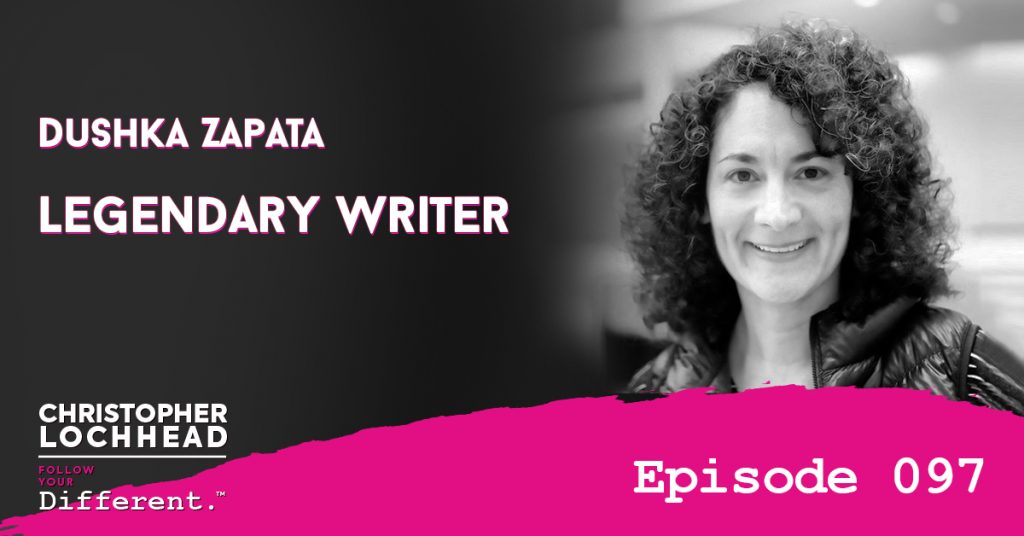
Podcast: Play in new window | Download (Duration: 35:44 — 32.9MB) | Embed
Subscribe: Apple Podcasts | Spotify | Pandora | RSS | More
One of the most prolific and important writers in the world and our most regular guest Dushka Zapata, joins us today. We had a heartfelt conversation about mending broken-hearts, why grief is worst when you’re young, why discipline is better than inspiration and many more!
Writing Beautiful Answers at Quora
You may find Dushka lounging in Question and Answer site Quora, where her writings receive 140 million views. Her life-affirming, fun and powerful answers have garnered her quite a following, including Christopher himself.
During this conversation, she shared a wonderful passage where we can learn a thing or to about mending a broken heart. She shares a story about a big, crowded yoga class she attended. The intention was to heal the physical and non-physical aspects of the person — whether a sprain, a wound or even sorrow, anxiety and loneliness.
“At this point, I sneaked a peek. I opened my eyes and slowly panned the room. I would say that 97% of the people on the room had placed both their hands over the left side of their chest.” – Dushka Zapata
She left a powerful message to readers, reminding everyone to tread very carefully in this world because, in reality, almost everyone is desperately trying to mend a broken heart.
Grief is Worse When You’re Young
Dushka shares another question lifted from Quora about a young 16-year old who wanted to marry her girlfriend. She crafted a very creative and wholehearted response: she affirmed what the young lad was feeling and then informed him that this feeling is temporary.
“Feelings — real and deep — change. Feelings change and the fact that they do is what breaks me. The fact that it changes, saves me and it will save you too.” – Dushka Zapata
She concludes that the younger you are, the more confusing things are because you don’t know you can survive them.
Discipline Matters More Than Being Inspired
Dushka shares to Christopher about some days in her career, where she counts on being disciplined, rather than inspired., which she believes is the secret to anything.
“I don’t think there is such a thing as motivation. I think that you just do it because, you said you are gonna do it every day.” – Dushka Zapata
More on this Oddcast, Christopher, and Dushka discuss the importance of being an amateur. She also conversed about her new book, You Belong Everywhere and Other Things You’ll Have to See for Yourself.
To hear more about Legendary Writer Dushka Zapata, download and listen to the episode.
Bio:
Dushka Zapata is one of the most prolific and popular writers working today.
On question and answer site Quora her work has been viewed over 140 million times.
She’s the author of eight best-selling books.
Dushka has over 20 years experience as a senior communications executive in Silicon Valley.
When she’s not writing, she serves as a communications executive at tech juggernaut Zendesk.
Links:
New Book: You Belong Everywhere and Other Things You’ll Have to See for Yourself
We hope you enjoyed this episode of Follow Your Different™! Christopher loves hearing from his listeners. Feel free to email him, connect on Facebook, Twitter, Instagram and subscribe on iTunes!
011 The Perception of Your Product is Your Product
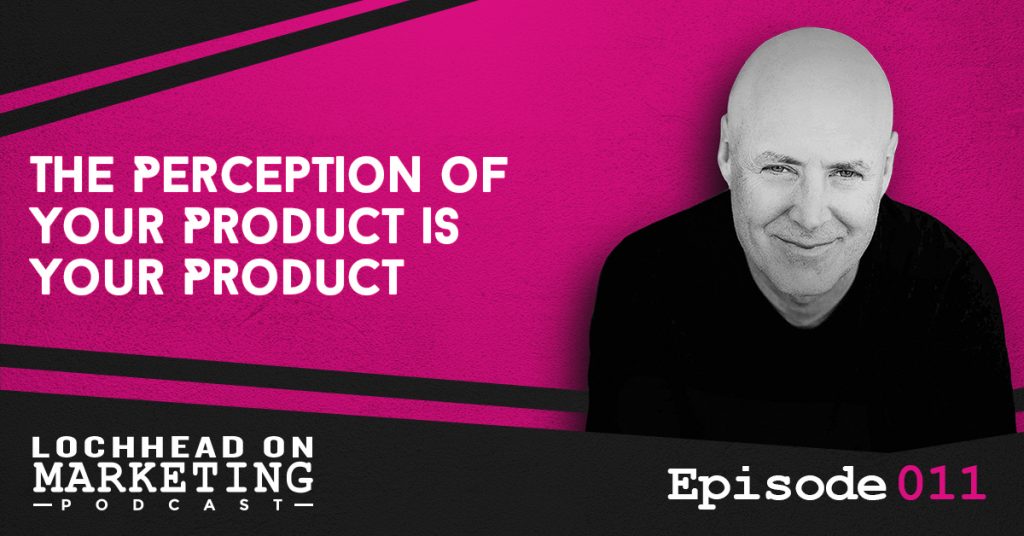
Podcast (lochheadonmarketing): Play in new window | Download (Duration: 9:13 — 8.5MB) | Embed
Subscribe: Apple Podcasts | Spotify | RSS | More
In this episode. Christopher Lochhead talks about what your real product or real service is. He discusses why product development and marketing should team because the perception of your product is your product.
Marketing Defined
One CEO, who is also a good friend of Christopher, once stated that “Marketing is what you do when you have a shitty product.” He was telling Christopher about their competitor who had a significantly inferior product but is, at that time, out-marketing them. Additionally, quite a lot of people in Silicon Valley also think this way.
Wikipedia defines marketing and product as such: “In marketing, a product is an object or system made available for consumer use; it is everything that can be offered to a market to satisfy the desire or need of a customer.”
“I actually don’t want to disagree with Wikipedia, but I do want to propose a different perspective. Your real product, your real service, is people’s perception of your product and service.” – Christopher Lochhead
The People’s Perception of Your Products
Christopher asserts that your product and service is not your product, but what people say it is, think it is and feel about it. He thinks that what other people say about the product or the service, is the truth, regardless if we think of it as true or not.
He cites examples such as Harley Davidson and Jack Daniels. These brands may not be the most efficient in performance or the most premium whiskey available, but they have made a mark in the minds and the hearts of consumers. In fact, they are considered category kings.
However, Christopher also cited instances when people’s perceptions of product change, such as that of Facebook and Boeing 737 MAX. They can fix their products but the perceptions will take forever to change.
The “Perception Manufacturing Business”
Christopher believes that we are in the “perception manufacturing business.” Further, he mentions that not only does the perception of the product more important than the product itself, but it is also actually what the developer is building when he builds and market the products.
“You don’t make products, you make perceptions about products. That is why legendary marketing is equally important to building legendary products.” – Christopher Lochhead
In conclusion, Christopher says that product engineering, product development, and marketing need to come together. They must realize that they are in the “perception manufacturing business.”
“It is ludicrous to say marketing is what you do when you have a shitty product. Marketing is what you do when you have a legendary product and you want people to perceive it as such.” – Christopher Lochhead
To hear more about the Perception of Your Product is Your Product and more relevant information from Christopher Lochhead, download and listen to the episode.
Bio:
Christopher advised over 50 venture-backed startups. He is a venture capital limited partner and a former three-time Silicon Valley public company CMO, entrepreneur. In addition, he co-authored two bestsellers: Niche Down and Play Bigger.
After he flunked school, with few other options, Christopher started his first company at the age of 18.
He was a chief marketing officer of software juggernaut Mercury Interactive. Hewlett-Packard, in 2006, acquired that company for $4.5 billion.
Further, he also co-founded the marketing consulting firm LOCHHEAD. Christopher was the founder/CMO of Internet consulting firm Scient. He also served as head of marketing at the CRM software firm Vantive.
Christopher loves his family and friends. He thinks the Ramones are legendary and loves riding the mountains and waves of Northern California.
We hope you enjoyed this episode of Lochhead on Marketing™! Christopher loves hearing from his listeners. Feel free to email him, connect on Facebook, Twitter, Instagram and subscribe on iTunes!
010 Artificial Intelligence In Marketing
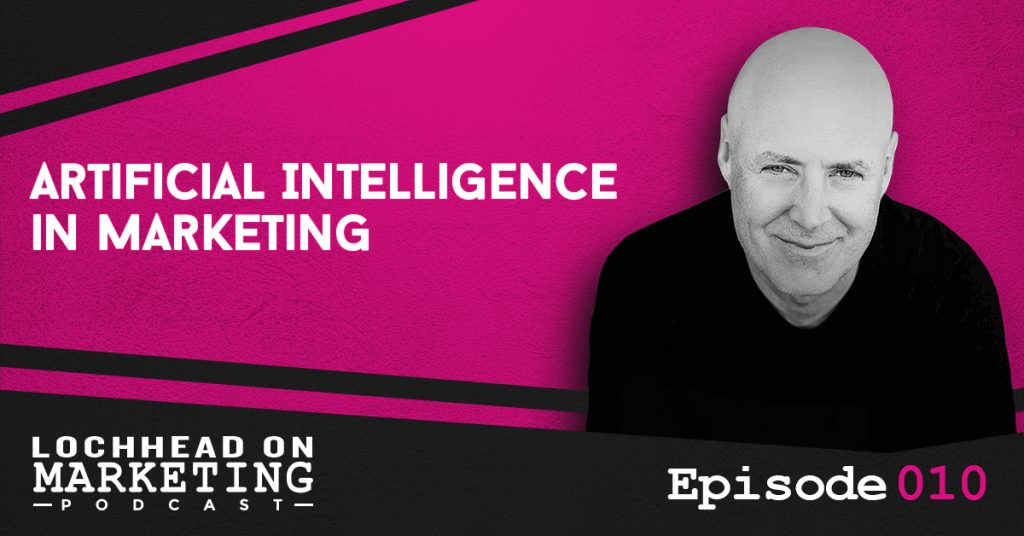
Podcast (lochheadonmarketing): Play in new window | Download (Duration: 12:51 — 11.8MB) | Embed
Subscribe: Apple Podcasts | Spotify | RSS | More
In this episode, Christopher Lochhead shares two eye-opening stories about Artificial Intelligence in Marketing. First is about Nike buying an AI marketing analytics company and second, Chase Bank using AI to write marketing copies. He further discusses how these two leverages technology to produce massive results.
Nike Acquires AI Startup
Tech Crunch reported that Nike announced its acquisition of the Boston-area startup Celect. This is to help Nike beef up its predictive analytics strengths. The startup’s tech focuses on delivering data insights based on structured and unstructured retail data.
“What we do know is Nike spent a lot of money to get their hands on a company that specializes in crunching a shit ton of data, of many thousands of customers, to anticipate their needs going forward.” – Christopher Lochhead
Christopher noted that this move of a giant brand has never happened in the past. In conclusion, this proves that analytics plays a huge role in Marketing. AI provides marketers data on customer’s wants and needs — even before they do.
“What kind of big data analytics and AI are we using to understand our market categories and what might we do in this area?” – Christopher Lochhead
AI Machines Outperforming Humans
AdAge published an experiment that they conducted about the bank company Chase. They compared the advertising copies written by humans versus that of AI technology. The result is: AI outperformed humans — with higher consumers clicking on the copy written by an AI machine.
“The folks at Chase Bank entered a five-year agreement with this company Persado to use machine learning to write their ad copy.” – Christopher Lochhead
The Implications of AI Marketing
Legendary marketers should always be experimenting with both the art and the science of marketing.
“We’re gonna see more companies benchmarking the two — whether ad headlines and copy, logo design and a lot of other creative things. What many of us in marketing thought technology wouldn’t touch — are now being touch by that.” – Christopher Lochhead
As the lines of Science and Art blur, Christopher calls out to fellow Creative professionals to stay in tune with technology. Never be complacent about our jobs because AI is coming to replace everything. The best action to do at the moment is to leverage this technology and not to resist it.
“Leverage the science and be super strategically creative at the same time.” – Christopher Lochhead
To hear more about Artificial Intelligence Marketing and more relevant information from Christopher Lochhead, download and listen to the episode.
Bio:
Christopher advised over 50 venture-backed startups. He is a venture capital limited partner and a former three-time Silicon Valley public company CMO, entrepreneur. In addition, he co-authored two bestsellers: Niche Down and Play Bigger.
After he flunked school, with few other options, Christopher started his first company at the age of 18.
He was a chief marketing officer of software juggernaut Mercury Interactive. Hewlett-Packard, in 2006, acquired that company for $4.5 billion.
Further, he also co-founded the marketing consulting firm LOCHHEAD. Christopher was the founder/CMO of Internet consulting firm Scient. He also served as head of marketing at the CRM software firm Vantive.
Christopher loves his family and friends. He thinks the Ramones are legendary and loves riding the mountains and waves of Northern California.
Link:
Nike buys an AI startup that predicts what consumers want
Chase Commits To Ai After Machines Outperform Humans In Copywriting Trials
We hope you enjoyed this episode of Lochhead on Marketing™! Christopher loves hearing from his listeners. Feel free to email him, connect on Facebook, Twitter, Instagram and subscribe on iTunes!
096 Performance Marketing & Podcasting Media w/ Dan Granger, CEO of Oxford Road
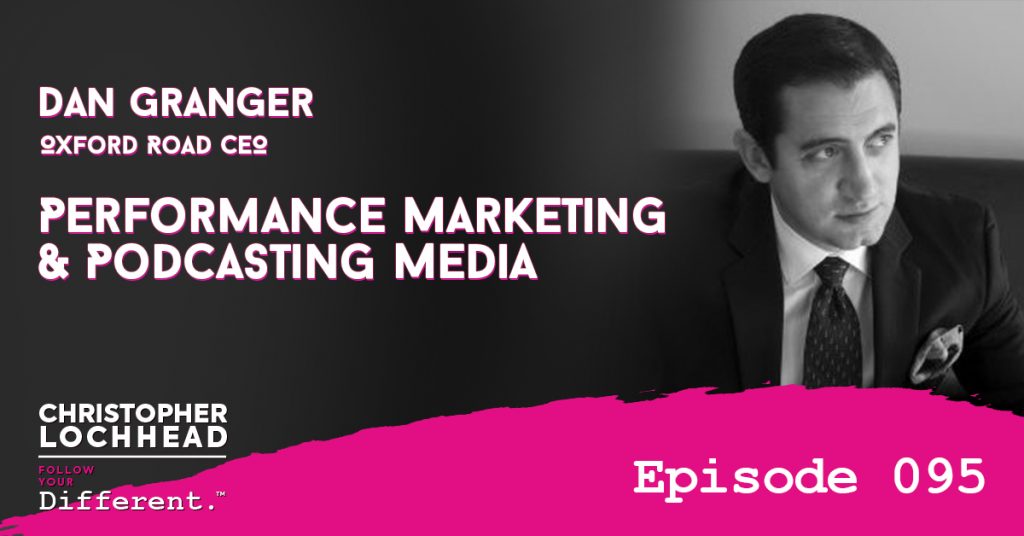
Podcast: Play in new window | Download (Duration: 54:34 — 50.2MB) | Embed
Subscribe: Apple Podcasts | Spotify | Pandora | RSS | More
Podcasting has never been hotter! Dan Granger joins us today to have a unique, thoughtful and inspiring conversation about performance marketing & podcasting media. He is the CEO of Oxford Road, the pioneer in digital performance advertising, which he also talks about today.
The Incubation Period
Dan has done an incredible job of being early in new digital areas that produce meaningful results both for a performance and branding perspective for marketers.
He started paying attention to podcasting way back in 2006 but not only until the year 2012 did he start monetizing it, through advertisement placement on podcasts. Officially in 2013, they started working with unheard-of brands like Zip Recruiter, Blue Apron and Hulu.
“I had a 10-year background in radio. What was interesting is we get to ride two simultaneous waves that were really, really influential in the marketplace—both in media and general business.” – Dan Granger
Startups Building Businesses in Podcasting
Dan notes that it was all early adapters—geeks and gamers—who tried out podcasting and they resonated with people. Listeners appreciate the fact that something different happens technologically. In addition to that, the audiences were willing to try something that was entirely different and “disruptive.”
“I’m listening to audio in a way that has never been consumed before.” – Dan Granger on early listeners of podcasts
Podcasting is a big deal. Dan shares how a lot of brands got their growth spurt at the back of the podcast industry. They were efficient in buying these podcasts before it started to become popular with the mainstream.
“It really changes when you go ‘I’m really scared to spend this first 10 Grand’ to ‘I just got sold for a Billion dollars’ is a very different culture and priorities.” – Dan Granger
Is Podcasting Merging With Radio?
Christopher agrees with Dan about companies differentiating themselves quickly via podcasting. However, he noted the indirect proportion of the amount of growth and the actual dollar brought about by advertising.
“Yes this is a technological advancement, that means you can have more commercials. So my prediction, in not too distant future, we’re going to see advertising loads change tremendously. You may have to stick around till after the break.” – Dan Granger
Christopher posed an important question about whether podcasting is merging with radio formats. Dan candidly answered that it has many threats more than opportunities and it will be hard to fight this movement.
“There will be individuals who will stay independent — Joe Rogan, Tim Ferris, probably a lot of people like yourself who are really just purist and committed to the craft and love the fact that it’s not radio. It’s got this pirate radio about vibe to it.” – Dan Granger
To hear more about Performance Marketing & Podcasting Media and more relevant information about Dan, download and listen to the episode.
Bio:
Dan Granger is the CEO and founder of Oxford Road, a leading ad agency and ad-tech developer.
Since starting Oxford Road in 2013, Dan has teamed with countless “unicorn” companies on TV, radio and podcast advertisements on some of the country’s biggest shows, including Tim Ferriss and Joe Rogan.
Links:
Adweek Contributor Dan Granger
The Future of Performance Marketing With Oxford Road CEO Dan Granger
Mickey D’s is the latest company to hop on the branded podcast bandwagon
We hope you enjoyed this episode of Follow Your Different™! Christopher loves hearing from his listeners. Feel free to email him, connect on Facebook, Twitter, Instagram and subscribe on iTunes!
095 #1 Tech Startup In Africa w/ Matt Brown
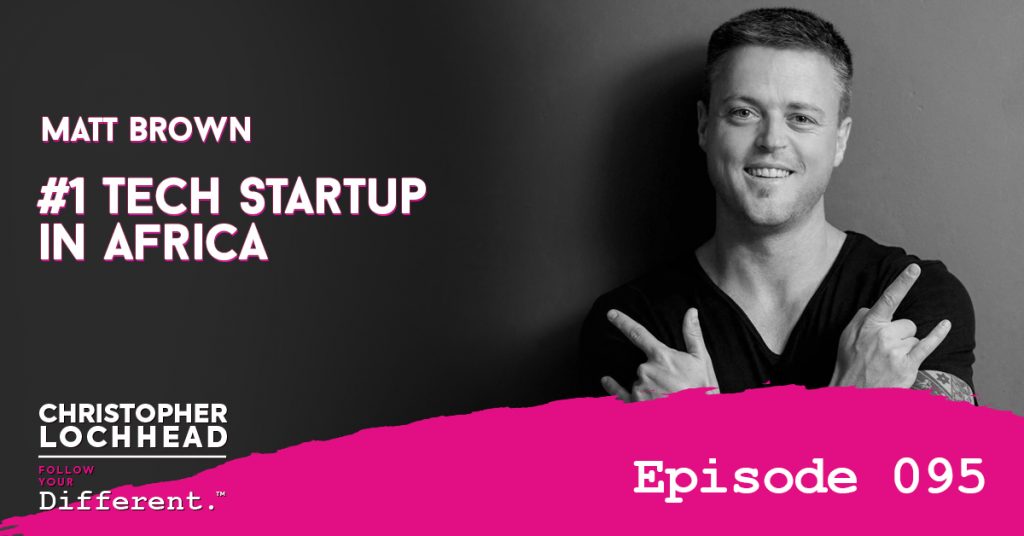
Podcast: Play in new window | Download (Duration: 1:11:59 — 66.1MB) | Embed
Subscribe: Apple Podcasts | Spotify | Pandora | RSS | More
Entrepreneur, CEO, and top podcaster Matt Brown joins us today for another no-BS conversation about being a Techpreneur in South Africa. He gives us a glimpse of the South African Tech scene, as well as his successes, as he was voted as #1 Tech startup in Africa in London Tech Week. Matt gives practical insights on business and life design as well.
#1 Tech Startup
Matt Brown, a very down to earth guy, recounts to Christopher his experience at London Tech Week, as organizers named him the #1 Tech Startup in Africa. Although he admits he now has unnecessary pressure due to the title, he claims it was a great opportunity for international development in the technology space.
“It was pretty insane when a government like the UK gets behind an idea. So what they have done is, they mobilized literally billions of pounds just for Africa Tech, 1.2 Billion pounds available for distribution.” – Matt Brown
The Storytelling Technology
Matt runs a firm called Digital Kung Fu and he candidly shares with Christopher his elevator pitch — “we’re the world’s fastest tech story production business.” He further shares that Christopher’s books Play Bigger and Niche Down inspired him in this business.
“The truth is were evangelizing this idea — which I totally started from your thinking by the way — category design thinking and creating a point of view that is unique and different.” – Matt Brown
He further shares that through his firm, they are connecting that point-of-view at scale to a market a way that it creates value. In his case, it is the storytelling technology.
“It’s about taking proven powers of storytelling and marrying that with technology — data, automation, AI — and delivering stories essentially at a scale that makes very complicated things in ways that are memorable and relatable and understandable.” – Matt Brown
The South African Tech Scene
Matt also talks about the South African tech scene, as other countries do not exactly know what is happening locally. He shares about the different challenges and opportunities they have there and the similarities in terms of trends.
“I think Africa has some unique challenges. We have infrastructure challenges, connectivity challenges, bandwidth challenges, and these things don’t typically exist in developed markets.” – Matt Brown
Amidst these challenges, Matt shares how these forces techpreneurs to innovate, especially in the mobile phones market.
“African tech has got a bad name in many respects. Basically at a type of expansion into emerging markets, it’s less competitive in many respects. But, the economic opportunities are huge because there is no competition.” – Matt Brown
Bio:
Matt is the CEO of Digital Kungfu. It was named as “Best Tech Startup 2019 – Africa Tech Week Awards.” The company is a lead generation and storytelling production company purpose-built for technology businesses.
Links:
The Matt Brown Show in partnership with London Tech Week creates State of X Season One on Prime
We hope you enjoyed this episode of Follow Your Different™! Christopher loves hearing from his listeners. Feel free to email him, connect on Facebook, Twitter, Instagram and subscribe on iTunes!
094 How We Make Stuff Now w/ Jules Pieri
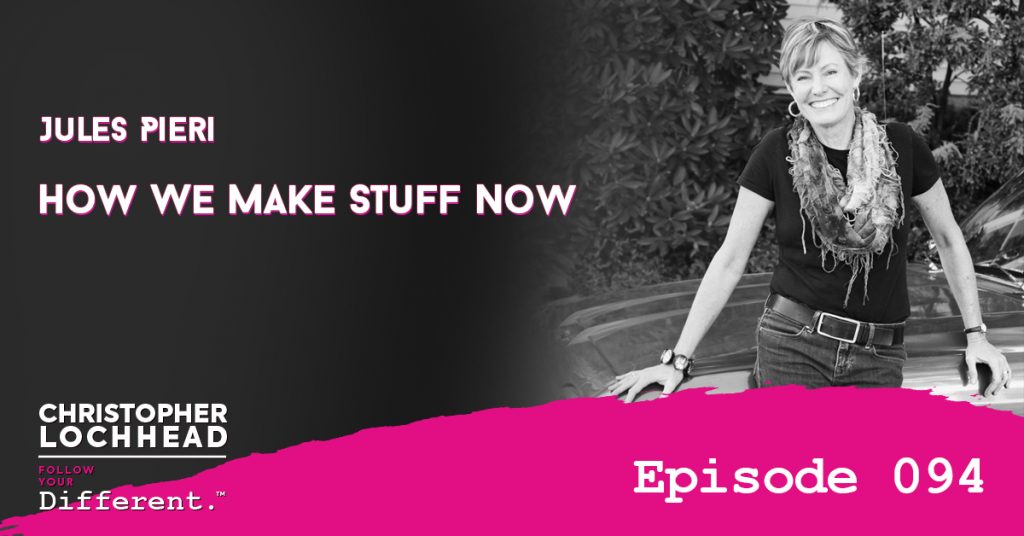
Podcast: Play in new window | Download (Duration: 51:45 — 47.6MB) | Embed
Subscribe: Apple Podcasts | Spotify | Pandora | RSS | More
Today’s episode features a highly informative discussion between our host, Christopher Lochhead and Jules Pieri. She’s the first designer to graduate from Harvard Business School. She shares some amazing lessons on how to create legendary new products and how to make sure those products succeed in the world.
Industrial Designer Turned Legendary Marketer
Fortune named Jules as one of the Most Powerful Women Entrepreneurs.” She is the Co-Founder and CEO of the product launch platform The Grommet.
Jules shares that before she formed the company, she observed the huge shifts in technology — specifically the internet, like the development of 3D printing. 3D printing enabled a huge new class of entrepreneurs with physical products.
“Creative people have access to inexpensive tools, they will use that. Physical products are less abstract than software, so they’re gonna inspire more people to participate.” – Jules Pieri
What We Can Learn From Squatty Potty
Jules shares with Christopher the story behind the product Squatty Potty — a stool that raises the leg of the user during elimination. Christopher labeled the product as legendary because it created a new need for consumers.
Jules admitted that it is often quite a challenge whenever they start a new category. She pointed out the importance for companies to be as bold as possible when launching a new product.
“They hired a great agency to get the ads done and they had more vision and courage than most companies tend to have at the early stages. That’s a super insecure stage of a company and they paid large money. Your reputation is aligned with these ads.” – Jules Pieri
Category Creation Is a Must
Jules remarked about the importance of category creation. She believes that it is very hard to cut through in a crowded world. She added that through The Grommet, they can create categories that enable them to study product searches of users.
“Category search, ‘cause names are not usually as memorable as descriptions.” – Jules Pieri
Christopher and Jules discussed more about Legendary Marketing, the differences between creating demand and capturing a demand. They also touch base on to have an invention and bring it to the world in a way that it would be connected, unique and distinct.
Jules also shares some important parts of her great, new book out called How We Make Stuff Now.
Bio:
Jules Pieri is Co-Founder and CEO of the product launch platform The Grommet.
The company’s Citizen Commerce™ movement is reshaping how consumer products get discovered, shared, and bought.
Jules started her career as an industrial designer for technology companies and was subsequently a senior executive for large brands, such as Keds, Stride Rite, and Playskool.
The Grommet is her third startup, following roles as VP at Design Continuum and President of Ziggs.com.
She completed her undergraduate degree at the University of Michigan and people tell her she is the first designer to graduate from Harvard Business School, where she is currently an Entrepreneur in Residence.
Fortune named Jules as one fo the “Most Powerful Women Entrepreneurs” in 2013.
In June 2014, White House Maker Faire invited Jules to launch The Grommet Wholesale Platform, connecting Makers with Main Street Retailers.
Links:
We hope you enjoyed this episode of Follow Your Different™! Christopher loves hearing from his listeners. Feel free to email him, connect on Facebook, Twitter, Instagram and subscribe on iTunes!
009 Marketing Strategy vs. Tactics
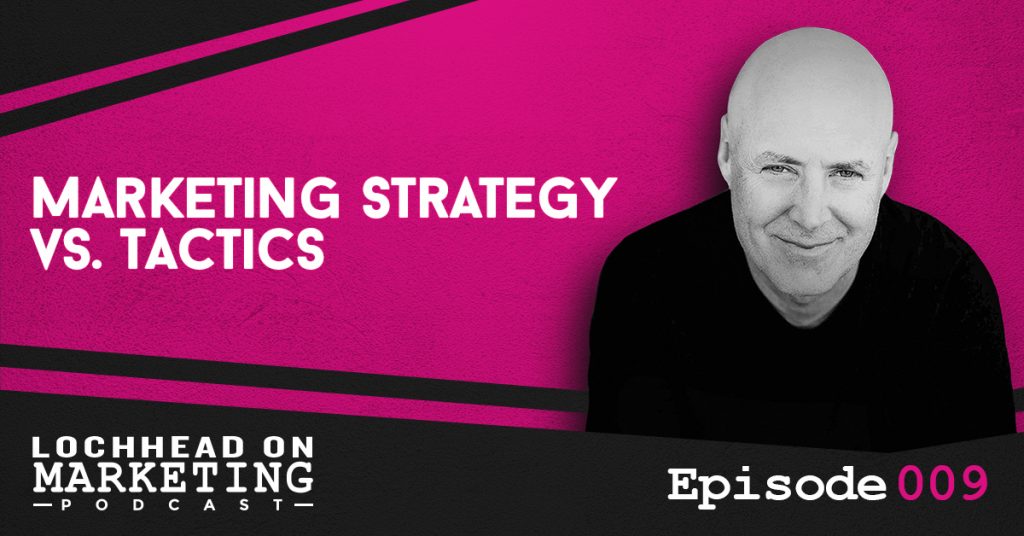
Podcast (lochheadonmarketing): Play in new window | Download (Duration: 4:40 — 4.3MB) | Embed
Subscribe: Apple Podcasts | Spotify | RSS | More
The difference between Marketing Strategy and Tactics, oftentimes, confuses most people. In this episode of Lochhead on Marketing, Christopher Lochhead talks about some of the pressing questions people have on strategy and tactics.
Quoting Dushka Zappata
A good friend of Lochhead, Senior Communication and PR Executive Dushka Zappata helps shine a light on this confusion marketers have about strategy and tactics. She has 20 years experience in the tech industry and she amassed 140 million views in Q&A site Quora with her writing.
Strategy
Dushka Zappata answered the distinction between strategy and tactics. According to her, strategy answers the question “why?” To give an example for this, one may ask, “why are we doing this, why do we think it’s a good idea?”
“For strategy, the answer should be a blend of data, understanding of trends and creativity.” – Dushka Zappata
Tactics
She further continued that tactics, on the other hand, answers the question “how.” This pertains to questions such as, “how will we get this done,” “what are the actions needed” and “what will get executed.”
Working on your marketing strategy and tactics need not be confusing. To be clear, strategy answers, “why,” and tactics answers, “how.”
To hear more about Marketing Strategy vs. Tactics and more relevant information from Christopher Lochhead, download and listen to the episode.
Bio:
Christopher Lochhead is a Top 25 podcaster and #1 Amazon bestselling co-author of books: Niche Down and Play Bigger.
He has been an advisor to over 50 venture-backed startups; a former three-time Silicon Valley public company CMO and an entrepreneur.
Furthermore, he has been called “one of the best minds in marketing” by The Marketing Journal, a “Human Exclamation Point” by Fast Company, a “quasar” by NBA legend Bill Walton and “off-putting to some” by The Economist.
In addition, he served as a chief marketing officer of software juggernaut Mercury Interactive. Hewlett-Packard acquired the company in 2006, for $4.5 billion.
He also co-founded the marketing consulting firm LOCHHEAD; was the founding CMO of Internet consulting firm Scient, and served as head of marketing at the CRM software firm Vantive.
Link:
We hope you enjoyed this episode of Lochhead on Marketing™! Christopher loves hearing from his listeners. Feel free to email him, connect on Facebook, Twitter, Instagram and subscribe on iTunes!
008 7 Recession Marketing Ideas
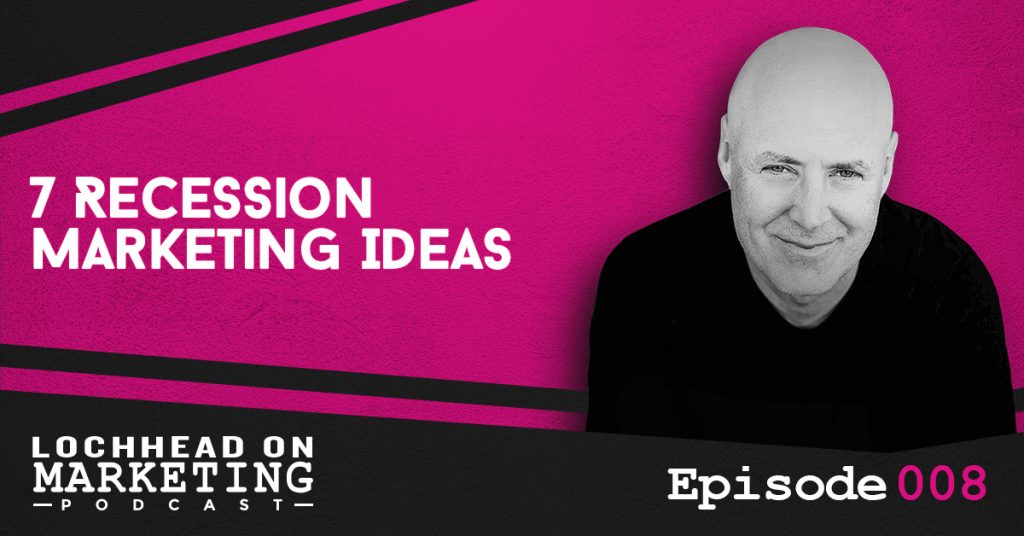
Podcast (lochheadonmarketing): Play in new window | Download (Duration: 20:45 — 19.1MB) | Embed
Subscribe: Apple Podcasts | Spotify | RSS | More
Christopher Lochhead discusses some of his marketing ideas timely for a potential (we hope not, but economists say otherwise) recession. Here are 7 recession marketing ideas for our listeners that you might want to consider for your business.
1. Never Let A Good Recession Go To Waste!
History proved that recessions are the impetus for change. With change comes both threats and opportunities. Ordinary business people usually panic and focus on threats. However, legendary marketers focus on both. Recessions are a great excuse for taking action, especially those that should have been taken anyway.
“Get on your recession planning now! Do not wait for the recession to happen. Get on it, regardless of whether or not we’re going to have a recession. They are great excuse to tighten up shit on your ship!” – Christopher Lochhead
2. Assume you can’t raise any more money
Recession talks are best paired with the assumption that there is no money available for lending — no more VCs, bank loans, operating lines or rich uncles. If you do raise equity or debt, expect that your valuation or market cap is likely coming down, so you will have to give up more equity to raise VC. Likewise your costs to service loans or operating lines is going up.
“Focus on your cash and remember that paying customers are your best VCs, your best bankers.” – Christopher Lochhead
3, Measure twice, cut once
Go through your marketing plans and budget with a magnifying glass. Christopher advises to categorize every single investment — either one time or on-going investments — into three buckets: must do, good to do, nice to do.
“Do not have more than a 3rd of your investments in ‘Must Do.’ Find at least 10% of your investments that you can cut now. If you want to get aggressive, find 25%. Plan to cut or re-deploy at least 5%, no matter what happens – recession or not.” – Christopher Lochhead
4. Brainstorm short-term ways to increase revenue
Come up with some packages or offerings you can promote to your best customers now. Brainstorm around 25 ideas on how to increase revenue immediately. Ideas that aims to provide customers with an incentive to buy more from you right now are the key to this before they start cutting back spending hard.
5. Market & Sell Into The Whitespace
Get a list of all of your existing customers and figure out which customers, own / use which of your products and services. This is to identify the white space or which customers are not users of all of your offerings.
6. Consider a competitor trade-in.
Recessions are a unique opportunity to destroy your completion.
7. Double Down on Your Category
This is an area you should focus on a recession. Chances are, most of your competition is going to panic and they most likely will over-cut marketing. Take advantage of the lower cost of marketing and go hard on content marketing, especially in social media.
“Your prospects and customers will be hearing less noise. Take advantage of this, to evangelize your category point-of-view. Become more visible, while your competition is hiding under a desk, asking for their mommies.” – Christopher Lochhead
Bio:
Christopher Lochhead is a Top 25 podcaster and #1 Amazon bestselling co-author of books: Niche Down and Play Bigger.
He has been an advisor to over 50 venture-backed startups; a former three-time Silicon Valley public company CMO and an entrepreneur.
Furthermore, he has been called “one of the best minds in marketing” by The Marketing Journal, a “Human Exclamation Point” by Fast Company, a “quasar” by NBA legend Bill Walton and “off-putting to some” by The Economist.
In addition, he served as a chief marketing officer of software juggernaut Mercury Interactive — which was acquired by Hewlett-Packard in 2006 for $4.5 billion.
He also co-founded the marketing consulting firm LOCHHEAD; was the founding CMO of Internet consulting firm Scient, and served as head of marketing at the CRM software firm Vantive.
Link:
We hope you enjoyed this episode of Lochhead on Marketing™! Christopher loves hearing from his listeners. Feel free to email him, connect on Facebook, Twitter, Instagram and subscribe on iTunes!
093 Microsoft’s Transformation and Why Every Company is a Software Company w/ Bob Evans
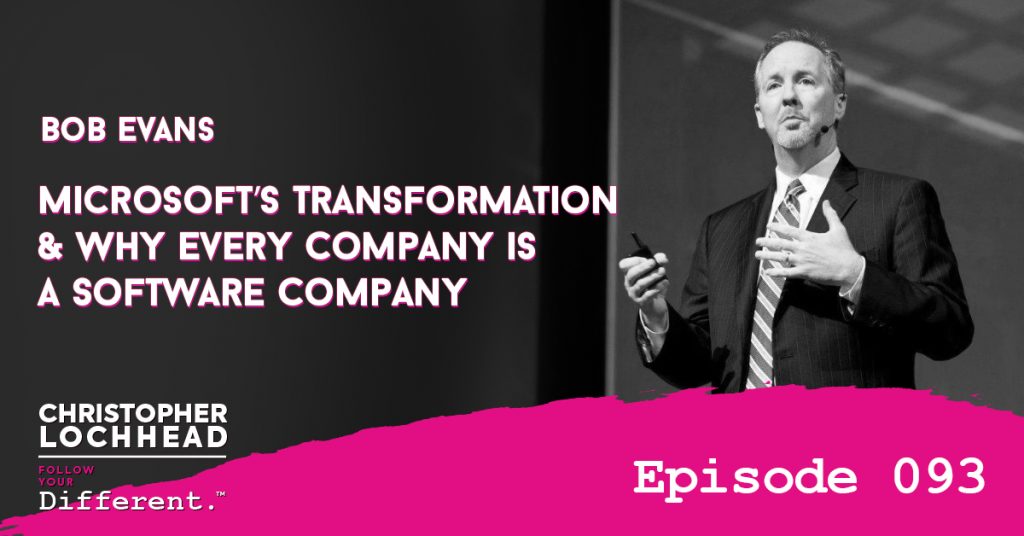
Podcast: Play in new window | Download (Duration: 52:52 — 48.6MB) | Embed
Subscribe: Apple Podcasts | Spotify | Pandora | RSS | More
Today’s guest is one of Christopher’s favorite people, host of Cloud Wars podcast, Bob Evans. Together, they dig deep into how Microsoft transformed into a “Trillion Dollar Cloud Category King.” They discuss what we can all learn from their remarkable turn-around. Moreover, the compare why they think every company is a software company and a lot more!
Microsoft: A Trillion Cloud Category King
Bob Evans shares his opinion on Microsoft and its trillion-dollar cloud business. This massive growth in sales led both Bob and Christopher awestruck. Bob shares that Microsoft CEO Satya Nadella has largely driven the company into its current status.
He pointed out that Nadella realized Microsoft was spending too much time achieving internally driven goals. He believed it’s about time to ask what are the goals and dreams of their paying customers, what do they need to happen and how can Microsoft help them.
“I think it should be an inspiration to all sorts of businesses. You are limited not by competitive set and not by how much money you have. You are limited by what your dreams and ambitions are.” – Bob Evans
Massive Restructure of the Sales Team
Microsoft had a massive restructuring of its sales team. They replaced as much as 30-40% of their sales team, infusing with people who formerly Programmers but they have the outlook and personality of salespeople. This led to high engagement with customers and ultimately, high profits for Microsoft.
“I just think its a phenomenon that lots of people can learn from here. You can come back, you can change, you can become something that other people say you’ll never be. Defy history.” – Bob Evans
Importance of Channel Partners
Bob discussed another point to remember from Microsoft — their special attention to the ecosystem or channel partners. The company supported its clients, especially for software development and programming. In the end, these clients later sold their programs to other clients, under the supervision of Microsoft.
“The most valuable company on Earth is willing to say ‘the way you have always done it isn’t the way to the future. I will turn my organization to make your sales team.’ They are doing stuff that defies anybody prediction or scope or the way they look at things. Imagine where they could be, that is the magic Nadella has brought about.” – Bob Evans
To hear more about Microsoft’s transformation and why every company is a software company and more information about Bob Evans, download and listen to the episode.
Bio:
Bob grew up outside of Pittsburg, with hard-working parents and his 6 siblings.
Graduated from the University of Pennsylvania in 1978 and entered the business world, flowing his passion for information technology and writing.
He rose to become the editor of Information Week, one of the top two publications in technology at the time.
He became the SVP and Content Director for Information Week’s parent company TechWeb/CMP
After thirty years in the media business, he left to join the world of software vendors, after a quick stop at ERP vendor SAP,
Bob was recruited by the world 5th richest person, a legendary category designer and entrepreneur — Larry Ellison, the founder of Oracle.
At Oracle Bob served as SVP and Chief Communications Officer for Larry.
Today Bob runs his own strategic communications firm, is a prolific writer, a tech industry commentator, public speaker, and a legendary guy.
He hosts the widely popular Cloud Wars Live Podcast.
Links:
We hope you enjoyed this episode of Follow Your Different™! Christopher loves hearing from his listeners. Feel free to email him, connect on Facebook, Twitter, Instagram and subscribe on iTunes!

